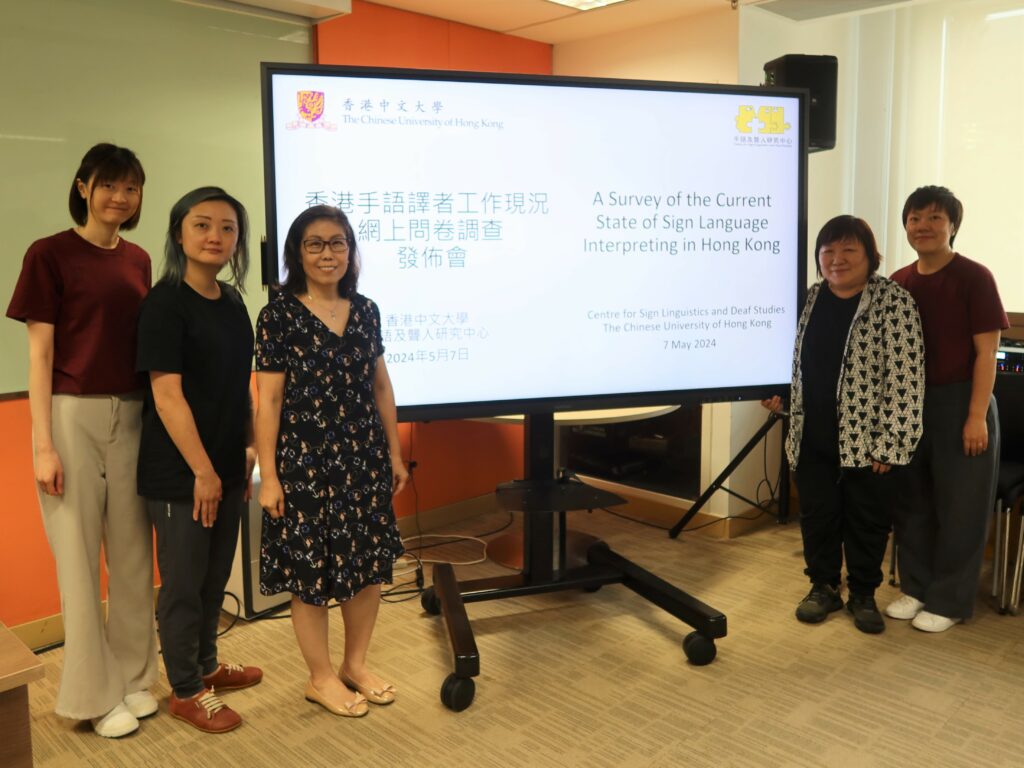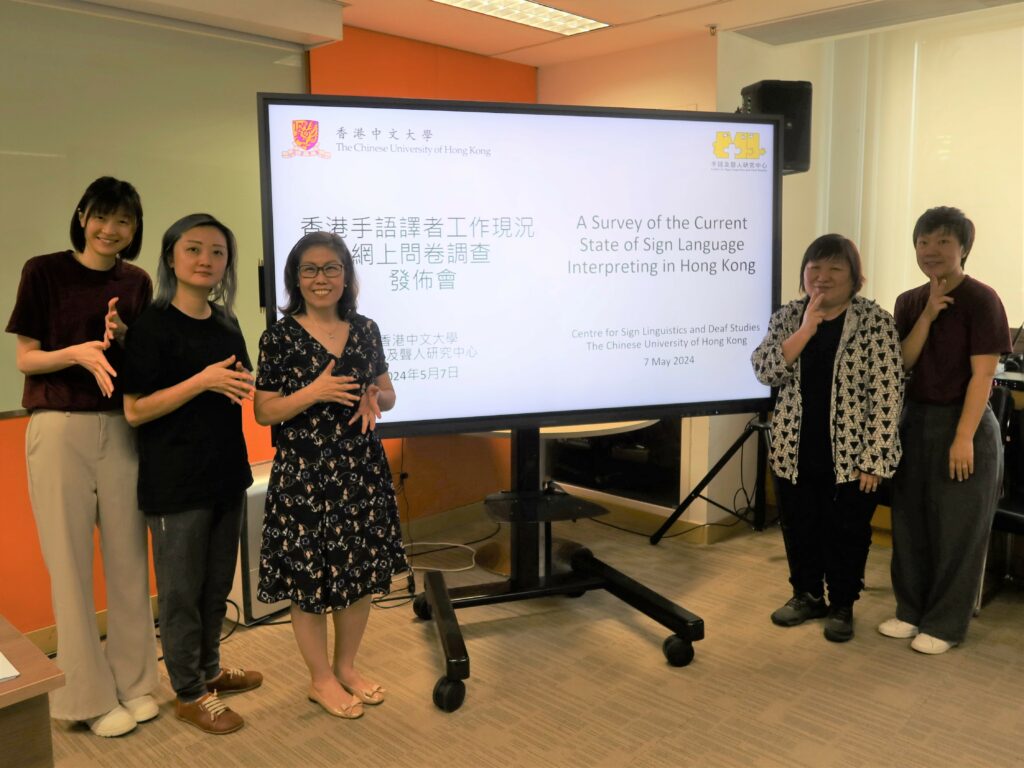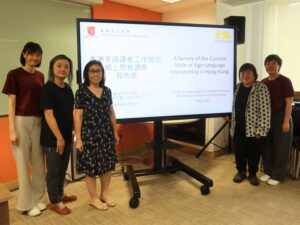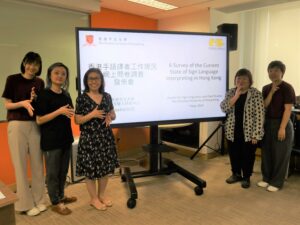CUHK
News Centre
CUHK surveys the status of sign language interpreters in Hong Kong
A call for an accreditation system and professionalisation
The Chinese University of Hong Kong (CUHK)’s Centre for Sign Linguistics and Deaf Studies (CSLDS), part of the Department of Linguistics and Modern Languages, is concerned about the communication needs of Hong Kong’s deaf community and the supply and quality of sign language interpreters in Hong Kong. Recently, the CSLDS conducted an online survey to gather insights into the working conditions of sign language interpreters in Hong Kong, their training needs, the types of interpreting work they commonly engage in and their expectations regarding professionalisation within the field in Hong Kong.
The vital role and lack of accreditation for sign language interpreters
Sign language interpreters play a critical role in facilitating communication between deaf people and the hearing community, especially in settings such as hospitals, academic institutions, courtrooms and police stations. Sign language interpretation is a profession that comes with a robust body of academic training and scholarly research in places like Europe and the US, with dedicated undergraduate programmes and regular publication of scholarly articles. East Asian jurisdictions like Taiwan, Japan and South Korea have established professional accreditation systems for sign language interpreters, along with interpreter associations that organise training and community outreach activities. However, Hong Kong lacks a systematic professionalisation and accreditation framework for sign language interpretation. There has even been a reported incident of statements made by a deaf defendant being misinterpreted in court[1].
There are only 55 interpreters listed on the registry of sign language interpreters maintained by the Hong Kong Council of Social Service (HKCSS). Project Investigator Dr Chan Yi Hin said, “Many governmental departments and commercial organisations require applicants of sign language interpreters to be on this list. However, the list only focuses on the number of hours worked, requiring applicants to provide proof of a minimum of 200 hours of interpreting work over the past two years, but this does not guarantee the quality of the interpreters who are on the list.”
Study reveals sign language interpreters are in dire need of professional support, pushing for professionalisation
The CSLDS conducted the online survey from March to April 2024, collecting responses from 185 sign language interpreters. The results revealed that over 70% of respondents have provided interpreting services on a voluntary basis, with 29% and 24% respectively having worked part-time or as freelancers, and less than 10% having worked full-time. These figures highlight that sign language interpretation is still not systematised or professionalised in Hong Kong.
Additionally, over 60% of the survey respondents were aged 45 or below, with 46% having less than five years of sign language interpretation experience. Nearly half of the respondents were relatively new to their interpreting careers, and almost 70% expressed an urgent need for more interpreting training courses. Currently, CUHK offers a 16-month part-time Professional Diploma in Sign Language Interpretation through its School of Continuing and Professional Studies. Dr Chan stated, “These survey figures can be attributed to the Hong Kong government allocating significant resources in recent years to promote diversity and inclusion, resulting in many Hong Kong citizens being attracted to learning sign language. The results also indicate a readiness among interpreters who are new to the field to invest time and effort in further training to enhance their skills and knowledge of sign language interpretation.”
The most common settings where respondents provide sign language interpretation services include medical consultations, educational activities, social welfare contexts, art and sports events, and live television broadcasts. Interpreters working in these contexts need to be proficient in Cantonese and Hong Kong Sign Language, understand the communication characteristics of deaf and hearing individuals, and be well versed in how to handle specialist terminology when interpreting.
When faced with challenges during their work, over 80% of respondents said they seek help from interpreter friends or colleagues; 78% turn to deaf friends; less than 20% approach their supervisors at work; and only 5% seek assistance from professional counsellors. Dr Chan, who has worked as a sign language interpreter in Hong Kong and the US for 15 years, emphasised that overseas sign language interpreter associations provide guidance when members encounter difficulties, but Hong Kong lacks such an association to support sign language interpreters.
Ms Joyce Pun, a sign interpretation service user and deaf interpreter, has encountered many interpreters whose work did not meet her expectations in terms of quality. She recounted an incident when an interpreter failed to accurately translate content involving specialist terminology and even added their personal opinions without her consent. While recognising the vital role of sign language interpretation, she faces challenges due to interpreters working on a voluntary basis and said it is understandable that their services are not as good as desired. She pointed out that different social welfare organisations and government departments may set up their own independent tests when recruiting interpreters and stressed the importance of establishing a comprehensive, territory-wide accreditation system for sign language interpretation in Hong Kong.
Professor Gladys Tang, Director of the CSLDS, highlighted survey results showing that an overwhelming 86% of respondents agree that accreditation would contribute to the overall professional development of sign language interpretation. 54% expressed their willingness to participate in an accreditation assessment, with a further 29% willing to consider it if prospective employers require it. Professor Tang underscored the significance of survey data in guiding the future professionalisation of the sign language interpretation industry, commenting, “We advocate for the establishment of a robust quality assurance system in line with international standards, ultimately benefiting deaf people, the sign language interpreter industry and society at large.
[1] Sing Tao Daily, 1 December 2022, https://www.stheadline.com/society/3172139







